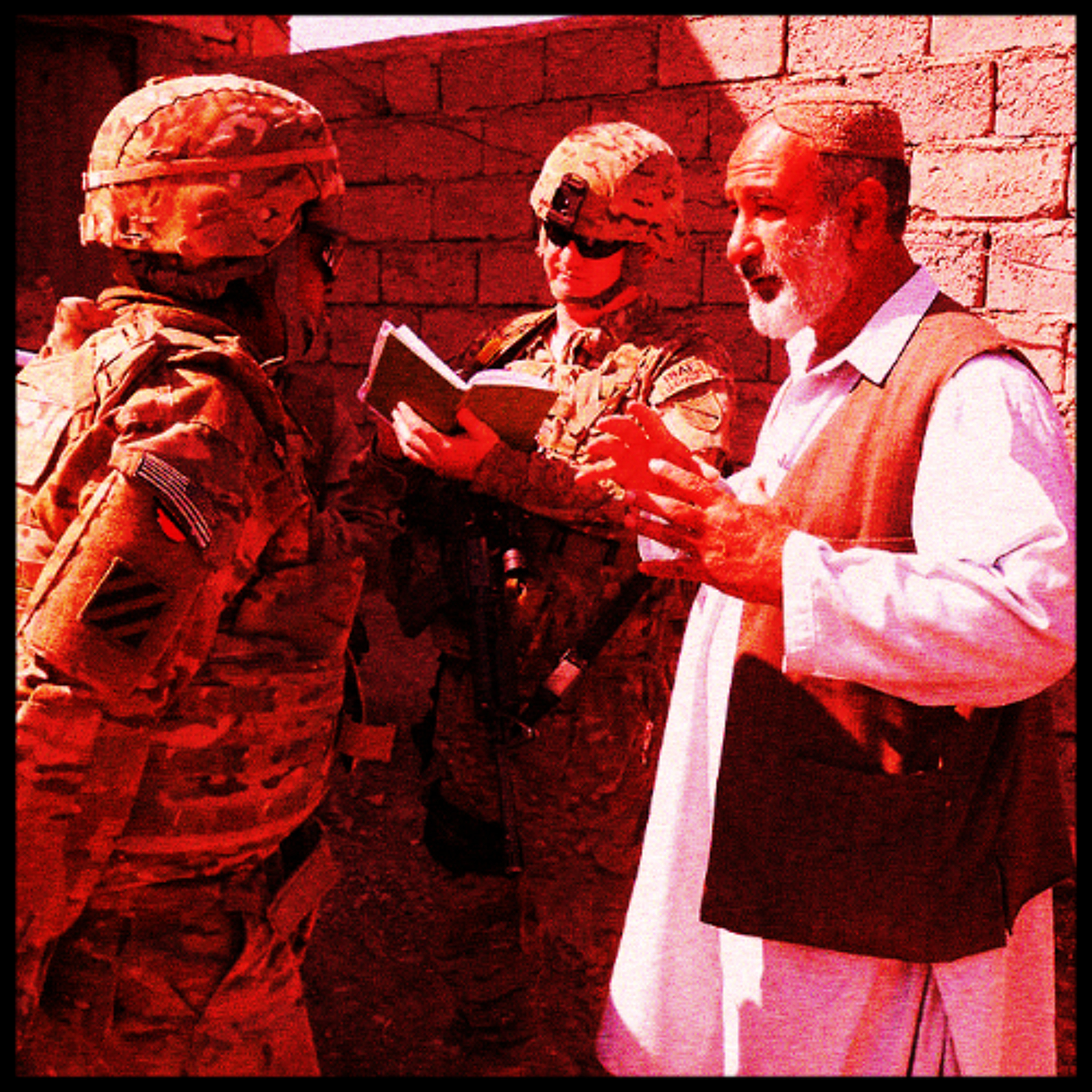*PREVIEW* The Human Terrain System
Get the whole episode on Patreon here! https://www.patreon.com/posts/bonus-episode-133688496
We've got merch available! Check out our store here: llbdpodcast.com/
Press play and read along
Transcript
Speaker 1 Now, obviously, these scientists were not going to be in the military. Instead, they would be civilian contractors.
Speaker 1 Through one of two companies, though, the vast majority were contracted through BAE Systems, an absolutely massive arms company involved in everything from bribes to alleged industrial spying to, of course, personal payments to Augusto Pinochet, amongst other things.
Speaker 1 If I'm not mistaken, help me out here. BAE is British, what is it, Aerospace Electronic Systems? Didn't they build the RG31? I don't remember.
Speaker 1 I'm pretty sure that the BAE systems are, among many, many, many, many other things, are the people who built the RG31 MRAP, which, or maybe one of their subsidiaries from South Africa built it.
Speaker 1 But yeah, they suck. Boer Industrial.
Speaker 1
It's from South African Land Systems, but designed by BAE. I was not wrong.
I love when I'm not wrong. Yeah, yeah, exactly.
Speaker 1 So the vehicle that I was in the most often in Afghanistan was designed by the same people. Wow.
Speaker 1 I really hate that something that BA designed absolutely saved my life one time.
Speaker 1 I wish you hadn't.
Speaker 1
It was the military version of design by Virgil Abla. I was like, yeah, he was in the room.
And it's kind of like, kind of has his input, but really, it was a lot of guys in short.
Speaker 1 One thing I find really funny, though, about the RG31, as a side note, really quickly, is that we could, literally, the radio would dump and fuck up so bad with the antennas that we would wind up having more luck talking on our manpack radios to the other cars or other vehicles in the convoy versus the powered antenna everything in the and i didn't i was like wow maybe my vehicle is just a lemon i was like oh no no no no no it's a british vehicle the electrics are always fucked that's something i didn't know until i moved to the united kingdom was like this is cost of territory yeah but because it was designed by south africans uh you'll have to use boer radio which is a very complex encryption system where you can only speak at racial slurs yeah exactly you have to have one member of the ant voort on the transmitter side and another member on the receiver side.
Speaker 1
Exactly. It's like code talking.
No, you don't realize the radio is powered by Biltong. You have to put the Biltong in the radio for it to work like a coin in the coin machine.
Speaker 1 I didn't realize that everyone from South Africa was from the Dominican Republic.
Speaker 1 I really hate the idea that in an episode about human terrain systems in Afghanistan, we've come up with Boer code talkers. Yeah, the Wind Talkers.
Speaker 1 Yeah, the fuckers.
Speaker 1 The Pretorio Wind Talkers.
Speaker 1 Yeah, weirdly, it only works in Perth and some weird suburb of Ohio now. Yeah, and if you take contact, you just say, poose.
Speaker 1 What's more interesting here is that the first teams were getting ready to be sent to Afghanistan and Iraq in 2007.
Speaker 1 And it quickly became clear that HTS's other job was selling the civilized scientific approach to war to the American people at home. And McFate was the perfect person for this job.
Speaker 1 She was touted as a, quote, radical academic, a child of hippies, and literally called a bohemian bad girl.
Speaker 1 Oh, Christ. Yeah.
Speaker 1 Manic Pixie war criminal.
Speaker 1 Bohemian bad girl sounds like the worst fucking 2000s French electro band you've ever heard.
Speaker 1 All these articles point out that she liked to wear big hats, smoke American spirits, and still had a little scar on her nose from what she used to have, a nose ring.
Speaker 1
Oh my God, I would have been so down bad for her in 2011. Man, we all would have.
It's fun.
Speaker 1
Her face and work were splashed across every piece of corporate media from coast to coast. She was fully embraced by every sector of the mainstream.
She was everywhere.
Speaker 1 uh like like a hype man but she was an academic and she was also embraced by the new commander in iraq David Petraeus.
Speaker 1 Now, he was considered, you know, he, well, not anymore, I will say, but there was a period of time where he was considered like the
Speaker 1 thinking man's officer,
Speaker 1
like the warrior, general, poet guy. I can give you a quick one.
I don't know a ton about his academic background, but I'm pretty sure he had. There isn't one.
I'm pretty sure
Speaker 1 he had at least a master's.
Speaker 1 David Petraeus basically got recognized because he was the commander, the division commander of the 101st in the invasion of Iraq.
Speaker 1 And then they were in charge of like the northern sector, including Mosul.
Speaker 1 And specifically in Mosul, he was like, oh, what if we paid the shopkeepers to keep their shops open or just gave them money, even though no one's buying shit in their stores to create the semblance of normality?
Speaker 1 And it's like when you compare him to somebody like Ray Odierno, who, besides being the chief of staff of the army, his biggest claim to fame as being in charge of, I think it was 4th ID or 1st Cav, was like, hey, some guys in your unit decided to take the curfew enforcement so seriously, they threw some people off a bridge and drowned them.
Speaker 1 So like, yeah, compared to Ray Odierno, David Petraeus seems like, wow, a smart man who can do smart wars. But at the end of the day, he still got, I'm going to be real with you.
Speaker 1
He went to West Point and got to where he was from being really, really fast at running. Like every senior officer in the U.S.
military, he also had great hair because you had to.
Speaker 1 Odierno, the rare exception.
Speaker 1
Bald. Odierno looks like a cop.
It looks like a thumb.
Speaker 1 Now, it's important to remember that any war-fighting population, imperial or otherwise, always wants to feel good about what their country is doing.
Speaker 1 They want to be convinced that they're the good guys, and the HTS program was that feel-good program.
Speaker 1 They wanted people to believe this was the new American military, a thinking military who wanted to deeply understand not the people.
Speaker 1 they were occupying, no, no, no, but our allies in the region to better serve their needs.
Speaker 1 See what I did there? That's pretty much what they were doing with Montgomery and McFayt at the time.
Speaker 1 Also, sorry to do this again as a tangent, but Petraeus and what eventually would become the Petraeus doctrine, something that the HGS system and program was heavily attached to, are absolutely full of shit.
Speaker 1 Petraeus' idea of what he called population-centric warfare boiled down to wide-scale, massive bribery to the elements of society that would mean to resist the ongoing occupation.
Speaker 1
We'll pay you money if you don't attack us. Yep.
Therefore, attacks slow down or stop. It makes command metrics look good, which means people must like us.
Speaker 1 And then you can put those numbers into media fluff pieces and then project them back home. There are less combat operations, therefore less civilian casualties.
Speaker 1 Everyone in Washington is happy, even though the underlying issues at play are never addressed.
Speaker 1 The insurgency has not been figured out. You just paid them to stay at home.
Speaker 1 I mean, famously, Petraeus is lauded for the so-called awakening in Iraq and the sons of Iraq.
Speaker 1 He paid people off and then was like, this is not what this episode is about, but he bribed groups in Iraq to attack other groups in Iraq that would not take the bribes effectively.
Speaker 1 And it was met with success.
Speaker 1 There was also a degree to which, like, people got really fucking sick of like basically international tour groups of jihadis coming and just like basically killing everyone. So, there was also that.
Speaker 1 Yeah. Part of the Mbar Awakening was the fact that it had been let to fester so long that you had these situations where people were really tired of civilians
Speaker 1 uninvolved in any side, Sunni civilians being killed by Sunni jihadis. And this created enough grievance that the U.S.
Speaker 1 was like, Well, I know you guys have made really, really bitch and fucking Nasheed videos of killing our guys, but what if we paid you to do that to like Al-Qaeda and Mesopotamia?
Speaker 1 Hey, Juba, what if we gave you 20 bucks? Yeah, who didn't exist before the Iraq War started? Yeah, I mean,
Speaker 1 this is not the wormhole to fall into, but it effectively boiled down to bribing groups to kill each other and not American soldiers. It created better metrics on paper and did not.
Speaker 1 solve any of the underlying issues of the insurgency.
Speaker 1 And in fact, many studies have shown it only actually made it worse because they centralized that money and spent it on better weapons and training to use later down the road.
Speaker 1 Winning the war of uh hearts and minds by giving someone 20 quid on a bootleg copy of Sony Vegas is just incredible. Well, I mean, I was just thinking about it too.
Speaker 1 That, like, yeah, we want to make it into the thinking man's army. And it's like, if you actually could commune with the hive mind of the U.S.
Speaker 1 military in the 2000s during the global war on terror, like it would coalesce into one single thought. And that thought would be, if I go crazy, then will you still call me Superman?
Speaker 1 god damn it
Speaker 1 like if i'm not gonna lie you got me with that one i didn't see that one coming now petraeus accepted the hts teams with arms wide open there you go um
Speaker 1 and due to his command style of that being a fucking tyrant yeah anyone who brought up the inherent problems of just paying off militant groups and bringing in anthropologists saw their careers ruined or slowed down.
Speaker 1
So as Petraeus rammed this shit home into the army hard, people around him just accepted it because he was David Petraeus. He would ruin them.
However, a small problem began to pop up.
Speaker 1 BAE began to discover that just because the army suddenly wanted to hire a thousand social scientists didn't suddenly mean that those people, A, wanted to work for BAE
Speaker 1
or B, existed at all in that number. Hey, look, you know, It's hard to get a job in the humanities.
Like, sometimes, you know, you have to go work for BAE systems.
Speaker 1 Sometimes you have to go to Afghanistan and like profile people and bribe people. You know, you gotta make a living somehow.
Speaker 1 In fact, the American Anthropology Association wrote to all of its members outlining their issues with the program.
Speaker 1 Most importantly, like we pointed out, it's terribly unethical, brings up the questions of consent, and you cannot do research in the military with military goals in mind and most importantly, surrounded by armed soldiers.
Speaker 1 Other groups circulated a petition of refusal, gathering thousands of signatures of scientists who refused to work for BAE or the government in this capacity.
Speaker 1 It kind of goes without saying there aren't exactly thousands of academics whose field of study in America covers Iraq and Afghanistan. And it's a very, very small field.
Speaker 1 And other than a few individuals, absolutely none of these guys would work with BAE.
Speaker 1 But that did not mean BAE was going to tell the government, hey, we can't fulfill this $1 billion contract you gave us. I guess you could have your money back.
Speaker 1 We've got an expert with on-the-ground, real-world life civilian experience in Iraq advising us. His name is Varg Vikranes.
Speaker 1
I forgot he spent time in Iraq. Yeah, he lived in Iraq because his dad was doing a project under Saddam's government as an engineer.
So he lived in Iraq for like a year in the 70s. Yeah, Vargas
Speaker 1
Bathistar. He calls it his like origin story of like about white supremacy.
You must imagine the enemy Euronym.





